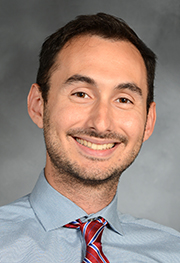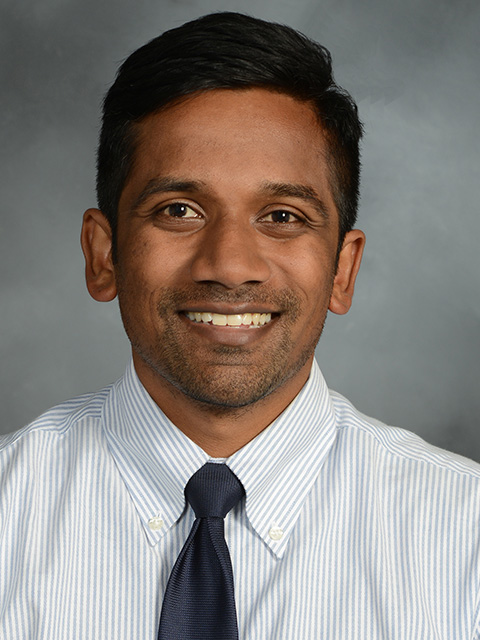Overview
The mission of the Liver Transplant Anesthesiology Fellowship is to train fellows to become expert consultant liver transplant anesthesiologists and perioperative physicians within a structured approach. Our fellows train in all aspects of liver transplant and advanced hepatobiliary anesthesiology to provide superior clinical care independently. The fellowship teaches transesophageal echocardiography (TEE) and prepares fellows for the Basic Perioperative Transesophageal Echocardiography examination. As liver transplantation is mostly centered in academic medical center settings, the fellowship also aims to promote research and other academic activities that are vital components of a successful career in academic anesthesiology.
Liver transplantation is a complex procedure that is performed on critically ill patients with multiple comorbidities. There are significant data that supports increased safety and improved outcomes with dedicated liver transplant anesthesiology teams. Liver transplant anesthesiologists must be facile with management of complex hemodynamics and physiology, vascular access procedures, and advanced monitoring which requires additional specialized training beyond residency. By offering this fellowship program, we support Weill Cornell Medicine’s mission to provide top-tier clinical education in all subspecialties of anesthesia. The fellowship also enhances the resident experience by providing an additional opportunity for residents to learn didactic and clinical knowledge from and alongside the fellows.
Fellowship Program
Learning Objectives
Patient care and procedural skills
By completion of fellowship, trainees will achieve the following competencies:
- Perform a comprehensive preoperative evaluation of the patient with end-stage liver disease including assessment of preoperative testing and perform preanesthetic assessments of high-risk transplant candidates
- Learn and participate in the formal selection of liver transplant candidates
- Perioperative management of acute/emergent and chronic liver disease and concurrent comorbidities; treat coexisting end-organ failure with evidence-based interventions in the perioperative period
- Independently develop an appropriate intraoperative and post-operative plan for complex surgical procedures
- Monitor and maintain normal physiology and delivery of anesthesia during the perioperative period for all types of liver procedures, including liver transplants, hepatic resections, emergency take backs for bleeding, and NORA site procedures for patients with hepatic disease
- Perform necessary arterial and venous cannulations safely and efficiently including utilization of ultrasound; demonstrate competency in interpreting invasive hemodynamic monitoring
- Provide goal directed management of both preoperative and intraoperative anemia, coagulopathies and massive transfusion utilizing and interpreting point-of-care testing modalities, utilizing best practice transfusion guidelines
- Demonstrate competency in obtaining basic images in transesophageal echocardiography, performing basic interpretation of imaging, and utilizing imaging to perform basic hemodynamic monitoring
- Understand the intensive care unit management of patients pretransplant and posttransplant patient
- Manage intraoperative complications that occur during liver procedures
- Utilize available evidence to guide patient care including in the face of unclear or conflicting clinical information
- Prioritize information and patient care in complex/critical situations, maintaining focus on larger goals while attending to key details of patient care
- Conduct oneself in a professional and ethical manner:
- the fellow will demonstrate respectful and compassionate behavior, and develop patient-centered interactive and communication skills with patients and their families
- the fellow will learn appropriate, efficient interaction and communication with ancillary staff in various clinical settings in a way that benefits patient care
Medical knowledge
Fellows will acquire and demonstrate understanding of:
- The common etiologies and current treatment of liver failure
- Injury to other organ systems caused by end-stage liver disease and current treatment
- The effects of disease on recipient and donor graft outcome
- The diagnosis and treatment options available for acute liver failure including medical management and end-organ support devices
- The phases of liver transplant surgery and surgical options in transplantation
- Changes in the pharmacokinetics and pharmacodynamics of common perioperative medications in patients with end-stage liver disease
- Common perioperative complications and treatment
- Immunosuppressive protocols used in transplant recipients
- Enhanced surgical recovery methods
- How patients are prioritized for transplantation and organ allocation methods
- Types of organ donation and the influence on patient and donor organ survival
- Understanding of the perioperative management of the living donor and considerations in liver donor transplantation
Systems-based practice
Fellows will:
- Work effectively with all members of the multidisciplinary transplant team
- Develop knowledge of systems and regulatory requirements including HIPAA compliance and risk management
- Coordinate patient care within the health care system and ensure appropriate transitions of care
- Incorporate cost awareness and risk-benefit analysis in patient and/or population-based care as appropriate
- Advocate for quality patient care and optimal patient care systems
- Maintain medical records and manage errors
- Work cooperatively as a member of the multidisciplinary professional team to enhance patient safety and improve patient care quality
- Evaluate and utilize performance data for professional development
Practice-based learning and improvement
Fellows will:
- Participate in regular learning activities (journal clubs, morbidity and mortality conferences, etc.)
- Use information technology to optimize learning (simulation and web-based learning, etc.)
- Incorporate formative evaluation feedback into daily practice in a format that encourages regular self-assessment
- Systematically analyze practices using quality improvement methods and implement changes with the goal of practice improvement
- Locate, appraise, and assimilate scientific evidence related to their patients’ disease
- Participate in the education of patients, families, trainees, and other health professionals, and serve as a role model for teaching and mentoring
Professionalism
Fellows must demonstrate:
- Compassion, integrity, and respect for others
- Responsiveness to patient needs that supersedes self-interest
- Respect for patient privacy and autonomy
- Accountability to patients, society, and the medical profession
- Sensitivity and responsiveness to a diverse patient population, including, but not limited to diversity in gender, age, culture, race, religion, disabilities, and sexual orientation
- Complete tasks in timely and efficient manner
- Exhibit a professional appearance
- Maintain effective and clear medical records
- Demonstrate the ability to navigate difficult conversations with the patient and family, and navigate conflicts between the patient/family and the health care system
Interpersonal and communication skills
Fellows should:
- Communicate effectively with patients, families, and the public, as appropriate across a broad range of socioeconomic and cultural backgrounds
- Communicate effectively with physicians, other health professionals, and health-related agencies
- Work effectively as a member and leader of a health care team
Curriculum
Advanced Clinical Training
Our program immerses fellows in high-acuity cases to master the complex physiology unique to liver patients. They will master advanced concepts in cardiovascular, respiratory, renal, and hepatic physiology. Fellows will apply these concepts in the context of:
- Orthotopic liver transplantation procedures (robotic and open)
- Simultaneous liver kidney transplantation
- Major hepatic resections
- Retrohepatic caval resections and reconstructions
Advanced Technical Skills
Fellows gain extensive hands-on experience critical for managing these complex cases, including:
- Veno-veno bypass and cell salvage techniques
- Rapid infusion systems
- Intraoperative hemodialysis
- Transesophageal echocardiography
- Pulmonary artery catheter and rapid infusion catheter placement
- Ultrasound-guided line placement and truncal blocks
Integrated Professional Development
Our non-ACGME accredited fellowship is designed for holistic growth, allowing fellows to diversify skills and build a robust foundation for a future career:
- Diverse Clinical Exposure: Opportunities and allocated time to work as a part-time attending for non-hepatobiliary cases, with scaled compensation.
- Academic Opportunities: Protected time is provided for participating in research, administrative and education projects.
- Competitive Compensation: We offer a competitive salary for the New York City area, with opportunities to supplement income with attending calls.
Clinical Experience
Weekly
- Fellows will be involved in liver transplant and advanced hepatobiliary cases as they are scheduled, estimated to involve 40-50% of total effort.
- Fellows will function one day per week (20% effort) as an attending anesthesiologist, assigned to general cases.
- The balance of time (30-40% of total effort) may be dedicated to research, other academic, and clinical elective activities as approved by the fellowship program director. Research activities must obtain approval from the Executive Vice Chair for Academic Affairs or Vice Chair for Research.
Overnight/weekend call
- Flexible based on liver transplant cases booked
- The program director will approve fellow call schedules
Annual
- Fellows will partake in the care of at least 50 liver transplant patients and maintain a log of all clinical cases.
Didactics
- Individual topic reviews with liver faculty
- Preoperative evaluation and patient selection for liver transplantation
- Anatomy and surgical techniques for liver transplantation
- Anesthetic considerations for each stage of liver transplantation
- Extended criteria and DCD donation including machine perfusion and NRP
- Monitoring for liver transplantation including TTE
- Acid/base and electrolyte management for liver transplantation
- Veno-venous bypass in liver transplantation
- Care of the patient with fulminant liver failure
- Living donor liver transplantation
- Coagulation and transfusion management in liver transplantation
- Considerations for intraoperative CVVH in liver transplantation
- Postoperative care of the liver transplant recipient
- Anesthesia for open/laparoscopic/robotic hepatectomy
- POCUS in the perioperative period
- Participation in multidisciplinary liver transplant selection committee (weekly)
- TEE case conference (weekly)
- Journal club with liver transplant faculty and CA-3 residents (quarterly)
- Resident lecture series (twice/year)
- Access to online repositories of lectures and educational materials through membership in professional societies:
- SATA (Society for the Advancement of Transplant Anesthesia)
- ILTS (International Liver Transplantation Society)
- ASE (American Society of Echocardiography)
- SABM (Society for the Advancement of Patient Blood Management)
Academic Expectations
- Collaboration with faculty for presentation at the Department of Anesthesiology’s annual Abdominal Transplant Division Grand Rounds
- Participation in formal scholarly activity with submission of work to regional or national level conference or publication (e.g., submission/presentation of an abstract, chapter, or manuscript)
- We encourage attendance and participation at regional and national society meetings
How to Apply
Eligibility
To be eligible to apply, fellowship applicants must have received a degree from medical school, followed by successful completion of four or more years of training in an ACGME-accredited residency program in anesthesiology.
Required documents are:
- CV
- Personal statement
- Medical school transcript and Dean's letter
- Three letters of recommendation
- ITE Exam Score
- ABA Basic Exam Score
Additional documentation accepted: SAE and any other similar progress examinations (can be emailed to maa2010@med.cornell.edu).
Only J-1 visas are accepted for appointment at NewYork-Presbyterian Hospital/Weill Cornell Medical Center Liver Transplant Fellowship Program.
Please email all liver transplant fellowship queries to Marlene Augustine, maa2010@med.cornell.edu.
Living in New York City
The Cornell campus of NewYork-Presbyterian Hospital is located on the Upper East Side of Manhattan.
- Learn more about living in New York City.
- View the subsidized housing offered to our fellows.
Fellowship Leadership

Joseph Scarpa, Jr., MD, PhD
Fellowship Director
Assistant Professor of Anesthesiology
Contact:
Marlene Augustine
Phone: (212) 746-2785
E-mail: maa2010@med.cornell.edu
Faculty
Christine Lennon, MD, Chief, Abdominal Transplant Anesthesiology
Julien Fessler, MD
Shreyajit R. Kumar, MD
Matthew T. Murrell, MD, PhD
Anup Pamnani, MD
Rohan Panchamia, MD
Joseph Scarpa, Jr., MD, PhD, Fellowship Program Director
Julia Sobol, MD, MPH
Zachary Turnbull, MD, MBA, MS
Current Fellow

Balaji Pandian, MD, MBA
2025-2026
Dr. Balaji Pandian was born in Florida and raised in Farmington Hills, Michigan. He earned his Bachelor of Arts in computer science from Harvard University before completing both his medical and business education at the University of Michigan. He subsequently completed his anesthesiology residency at NewYork-Presbyterian/Weill Cornell Medical Center.

